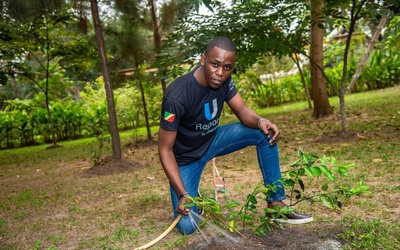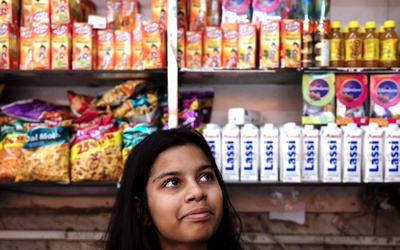In Cote d’Ivoire, more than 50% of our population are under the age of 25. These 14 million young activists and changemakers within their community represent the generation that will lead progress towards a future that is brighter, better, and more gender equitable. Across the country, many of these girls and boys have raised their voices on the issues, challenges, and concerns they face, coming together to build a movement. And one innovative mobilizing platform that Cote d’Ivoire’s youth movement has been using is UNICEF’s U-Report.
U-Report Cote d’Ivoire was launched in January 2017 as a platform that amplifies the voices, concerns and solutions of young people. U-Report users, called U-Reporters, can share, receive, and respond to content like polls and surveys on topics that matter to them. A year later, there are over 161,000 adolescent U-Reporters between the ages of 15-24 – 36% of which are girls – engaging on issues such as menstrual hygiene and ending gender-based violence offline and online through SMS, Facebook, and Twitter. As we mark U-Report Cote d’Ivoire’s one year anniversary, we’re reflecting on what makes U-Report a successful, effective communication tool amongst youth, and how we continue to strive for U-Report to be a more gender equitable platform that empowers girls and boys across the country. Here are 5 lessons we’ve learned:
1. Listen to youth as DECISION MAKERS
To make decisions that matter to young people, young people need a seat at the table too. Which is why our U-Report leadership is largely made up of young influencers who bring forward their personal stories, social networks, creative ideas for the future and work expertise to help shape the type of events, discussions, and topics we discuss on U-Report Cote d’Ivoire. Our team of five youth engagement strategists include ambitious, inspiring girls, who bring a fresh perspective on how to address gender priorities, and recruit and engage more girl U-Reporters. Their input positively influences how we communicate to ensure that we remain accessible and relevant to the needs and wants of adolescent girls and boys.
2. Work with STRONG social influencers and role models
Amie is one of our first U-Report ambassadors called porte-voix or “megaphone”. She is an influential girls’ rights advocate and founder of Ayana Webzine, a blogspace that talks about issues like menstrual hygiene management to ending violence against girls. She uses her digital platform to highlight the stories and voices of young girls, encouraging girls to join U-Report, demonstrating how U-Report is a safe, confidential and free platform, all the while providing useful information about jobs, sports, education, health, politics and culture. On why she founded Ayana Webzine, Amie reflects, “I want to share my experiences with my generation of girls and women. I am convinced that a woman in her own skin is able to achieve all the goals she has set for herself.” Amie and other influencers represent a network that champions gender equality and girls’ empowerment, and that girls and boys look up and listen to.
3. Create an OPEN conversation and dialogue
“Where is the nearest health centre for family planning services and info?”
“I have really bad period pains… What can I do to make it better?”
“What does UNICEF do in Cote d’Ivoire, and how can I help?”
These are just some of the questions that we get from U-Reporters across Cote d’Ivoire. The platform allows youths to receive real-time information and responses within 24 hours to their most pressing questions through live chats between issue experts like UNICEF programme specialists and U-Reporters. Sometimes, we receive over ten thousand questions within two to three hours on topics like HIV/AIDs, sexual harassment, menstruation and economic empowerment. It’s not just about polls and data. We want to create a conversation between all stakeholders – UN agencies, governments, NGOs, the private sector, and U-Reporters – to discuss, engage, and take action.
4. Discuss what matters to girls, while engaging boys
As important as it is to create a virtual platform for youth to voice their opinions and concerns anonymously and from anywhere in the country, it is also important to take that virtual network offline. U-Reporters regularly come together to meet one another in person. They participate in events and meetings across Cote d’Ivoire to brainstorm on poll topics, prepare live chat standard responses, and are the voice and representation of youth at high-level meetings and international forums. Last year, U-Reporters helped shape the UNICEF Investment Case for adolescents by being part of the discussion panels. They spoke on the “Africa we want” at the Cote d’Ivoire at Generation 2030 conference in South Africa and on the Africa Dialogue TedEx in Ghana. And just last month, a female U-Reporter represented the views and challenges young adolescent girls face at the International Conference on HIV and STIs (ICASA).
Gender equality is at the centre of U-Report Cote d’Ivoire’s mandate and one of our goals is to reach gender parity. We know that reaching girls can be tricky due to cultural, social, political, and economical barriers. To recruit more girl U-Reporters, we create multimedia content and lead events that speak directly to adolescent girls on the value of U-Report. What we’ve found is that despite a ratio of 36:64 girl to boy U-Reporters, girls tend to spend more time engaging with poll questions, especially when on girl-centric topics like ending child marriage and sexual and reproductive health. We want young girls to know that U-Report is an inclusive, accessible platform for them, all while creating an enabling environment by engaging boys too. Cheik Diallo, a female U-Reporter agrees with this sentiment. “I am proud to be a U-Reporter because I finally have a platform where I can participate in a concrete way on the issues that are important to me for the good of my community. Through U-Report, I want to promote women’s leadership and their participation in public life and local governance, so that they can defend girls’ education and women’s interests.”
5. Create a physical network of young, empowered changemakers
As important as it is to create a virtual platform for youth to voice their opinions and concerns anonymously and from anywhere in the country, it is also important to take that virtual network offline. U-Reporters regularly come together to meet one another in person. They participate in events and meetings across Cote d’Ivoire to brainstorm on poll topics, prepare live chat standard responses, and are the voice and representation of youth at high-level meetings and international forums. Last year, U-Reporters helped shape the UNICEF Investment Case for adolescents by being part of the discussion panels. They spoke on the “Africa we want” at the Cote d’Ivoire at Generation 2030 conference in South Africa and on the Africa Dialogue TedEx in Ghana. And just last month, a female U-Reporter represented the views and challenges young adolescent girls face at the International Conference on HIV and STIs (ICASA).
U-Report is a flexible tool with many potential uses and easily adapted based on experiences and learnings. In Côte d’Ivoire, young people have decided to make it more than a technology platform. U-Report is a community of young people – changemakers – who are taking action and raising their voices loudly on the issues that matter to them. U-Report Cote d’Ivoire will continue to seek gender parity among U-Reporters, and further ignite a youth movement that champions the rights and empowerment of every girl and boy.

Communications by U-Report Cote d’Ivoire specifically designed to recruit and engage girl U-Reporters. The posters describe “5 reasons for why girls should join U-Report”: (1) Let your voice be heard, (2) Defend your rights, (3) Break taboos, (4) Join a global movement, (5) Inspire.








